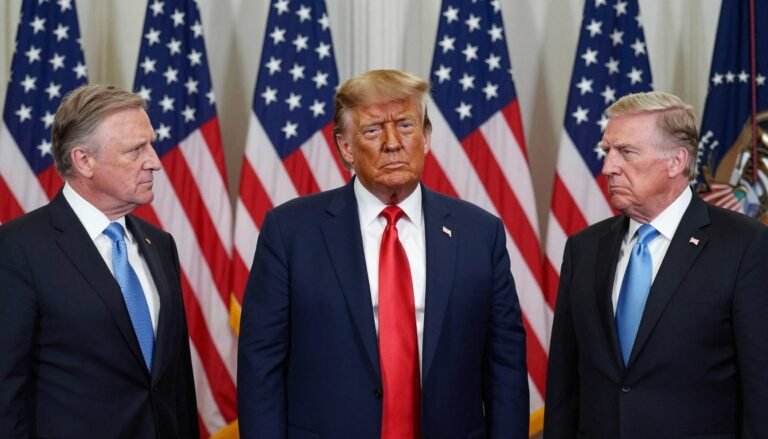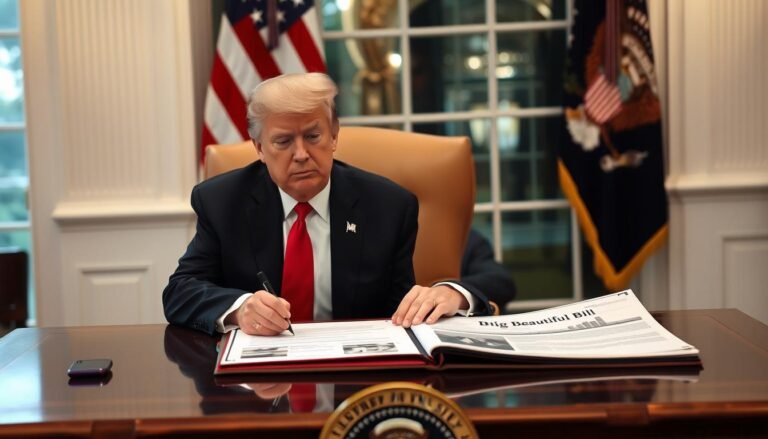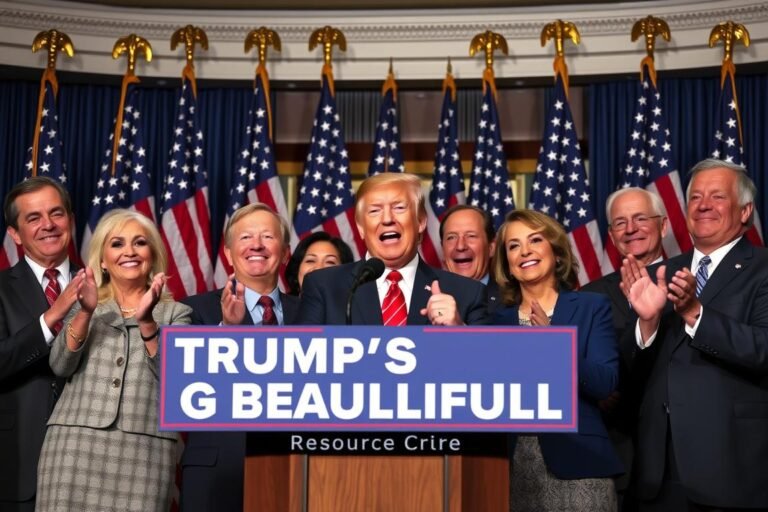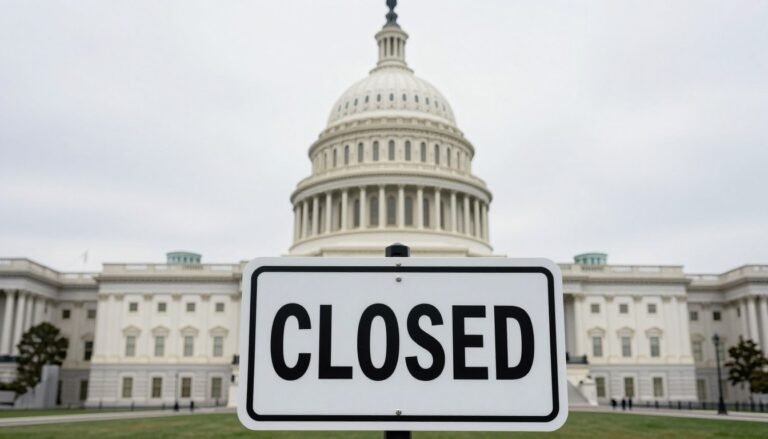Trump’s Big Beautiful Bill and America’s Foreign Policy: Isolation, Engagement, or Realignment?
As the One Big Beautiful Bill makes its way through Congress, questions arise about its implications for America’s role on the global stage. While much attention has focused on its domestic provisions, the bill contains significant elements that could reshape U.S. foreign policy for years to come. This analysis examines how the legislation might alter America’s international posture, from NATO relationships to China strategy, and what it means for global stability.
Understanding Trump’s Big Beautiful Bill: Key Foreign Policy Components
The One Big Beautiful Bill represents one of the most comprehensive legislative packages in recent history, with provisions touching virtually every aspect of American governance. While primarily focused on domestic priorities like tax cuts and border security, several components have direct foreign policy implications.
President Trump meets with congressional leaders to discuss the One Big Beautiful Bill’s foreign policy implications
The bill allocates $153 billion for military funding increases, including $25 billion for the “Golden Dome” missile defense system and $29 billion for shipbuilding. These investments signal a renewed emphasis on military readiness and power projection capabilities that could significantly impact America’s global posture.
Additionally, the legislation includes substantial border security funding, with $46.5 billion allocated for wall construction and associated infrastructure. This focus on territorial security reflects the administration’s “America First” approach that prioritizes domestic concerns over international engagement.
Peace Through Strength: Military Funding and Global Security
The One Big Beautiful Bill delivers on what proponents call a “Peace Through Strength” agenda, echoing President Reagan’s Cold War approach. The $153 billion military funding increase focuses on modernizing equipment, enhancing readiness, and developing next-generation defense systems.

The bill allocates $29 billion for shipbuilding to strengthen America’s naval capabilities
The centerpiece of this military investment is the $25 billion “Golden Dome” missile defense system, designed to protect the American homeland from ballistic missile threats. This system represents a significant technological leap forward and could alter strategic calculations with adversaries like North Korea and Iran.
“The One Big Beautiful Bill delivers on President Trump’s Peace Through Strength agenda by funding the Golden Dome missile defense system and modernizing our military to prioritize lethality and readiness.”
Critics argue that such massive military investments could trigger arms races with rivals like China and Russia, potentially destabilizing global security. Supporters counter that only through overwhelming military superiority can America deter aggression and maintain peace.
Border Security and Immigration: Domestic Policy with Global Implications
The bill’s substantial investment in border security—$46.5 billion for wall construction plus additional funding for enforcement agencies—represents more than just domestic policy. It signals a fundamental shift in how America views its relationship with neighboring countries and global migration patterns.

The bill provides $46.5 billion for border wall construction and associated infrastructure
Senator Roger Marshall (R-KS) emphasized the importance of these provisions: “Our country stands at a crossroads. Thanks to President Donald Trump’s and Homeland Security Secretary Noem’s leadership, our border is secure. We can either capitalize on this success and give law enforcement the resources it needs to keep it secure by passing the One Big, Beautiful Bill, or we can let the sacrifice of our men and women on the ground be in vain.”
This approach to border security has significant implications for U.S. relations with Mexico, Central American nations, and international organizations dealing with migration and refugees. Critics worry it could damage diplomatic relationships with key regional partners, while supporters argue it strengthens America’s negotiating position.
Economic Foreign Policy: Trade, Energy, and Global Competition
The One Big Beautiful Bill contains several provisions that would reshape America’s economic relationship with the world. By making the 2017 Trump tax cuts permanent and adding new incentives for domestic manufacturing, the legislation aims to strengthen America’s competitive position globally.

The bill includes incentives for domestic manufacturing to compete globally
The bill also takes aim at clean energy tax credits established under the Biden administration, potentially affecting America’s participation in global climate initiatives. As the White House states, “It unleashes American energy, refills the Strategic Petroleum Reserve, and repeals the Green New Scam policies.”
| Economic Provision | Foreign Policy Implication |
| Permanent tax cuts | Potential competitive advantage in attracting global investment |
| Domestic manufacturing incentives | Reduced dependence on foreign supply chains |
| Rollback of clean energy credits | Potential tension with climate-focused allies |
| Coal production tax incentives | Divergence from global energy transition trends |
These economic provisions reflect a prioritization of domestic economic interests over global coordination, potentially creating both opportunities and challenges for American diplomacy.
Regional Impacts: How the Bill Affects Key Relationships
The One Big Beautiful Bill would have varying impacts on America’s relationships with different regions and countries around the world. Understanding these regional dynamics is crucial for assessing the legislation’s full foreign policy implications.
NATO and European Allies

The bill’s military funding increases could affect NATO burden-sharing discussions
The bill’s substantial military investments could reinforce America’s commitment to NATO while simultaneously increasing pressure on European allies to boost their own defense spending. The “Peace Through Strength” approach echoes longstanding concerns about NATO burden-sharing that characterized Trump’s first term.
China and the Indo-Pacific
Several provisions target economic competition with China, including the phased-in tax on products manufactured in China and incentives for domestic manufacturing. These measures signal a continued focus on economic competition with Beijing that transcends partisan divisions in Washington.
Middle East and North Africa
The bill’s military funding increases, particularly for missile defense, could significantly impact America’s posture in the Middle East. Enhanced military capabilities might embolden regional allies while potentially increasing tensions with adversaries like Iran.
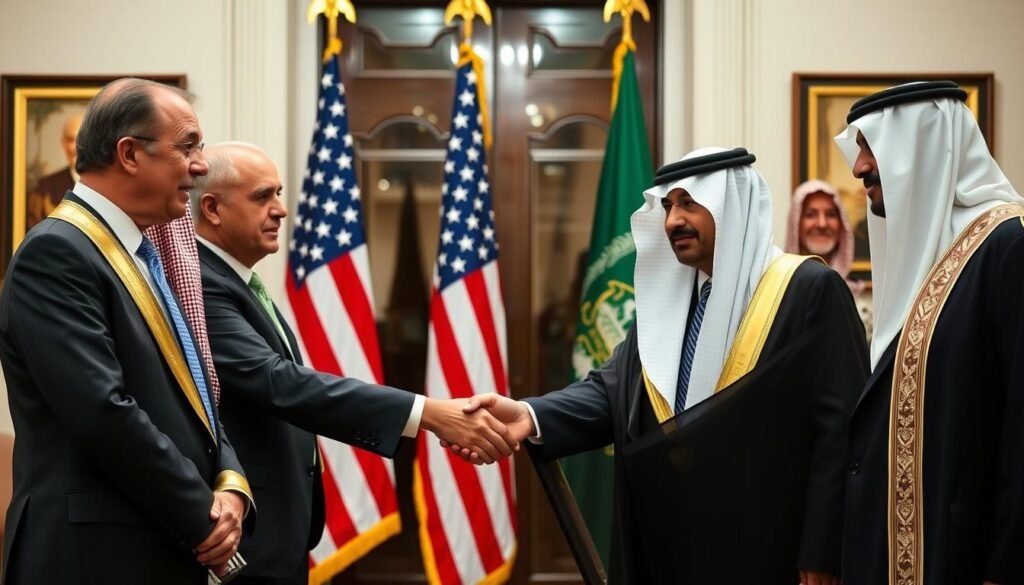
Regional relationships in the Middle East could be affected by the bill’s security provisions
Latin America and the Caribbean
The bill’s border security provisions would have the most direct impact on U.S. relations with Latin America, particularly Mexico and Central American nations. The emphasis on physical barriers and enforcement could complicate diplomatic efforts to address root causes of migration.
Competing Perspectives: Support and Criticism
The One Big Beautiful Bill has generated strong reactions across the political spectrum, with supporters and critics offering sharply different assessments of its foreign policy implications.
Supporter Arguments
- Strengthens America’s global position through military modernization
- Reduces dependence on foreign countries for energy and manufacturing
- Prioritizes American interests over international commitments
- Creates leverage for better trade and security deals
- Addresses border security as a national security priority
Critic Arguments
- Risks damaging relationships with key allies and partners
- Could trigger arms races with major competitors
- Withdraws from global leadership on climate and other issues
- May isolate America diplomatically on critical challenges
- Prioritizes unilateral action over multilateral cooperation
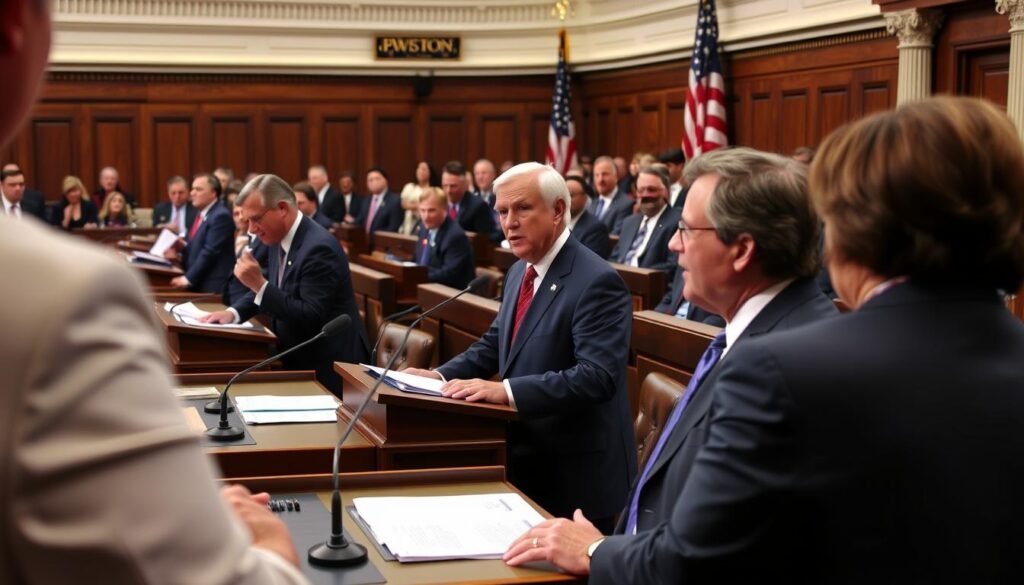
The bill has generated intense debate about America’s global role
Rep. Tom Cole (R-OK) expressed strong support: “Last November, the American people gave their Representatives a mandate when they overwhelmingly voted for change. 77 million Americans made it very clear to us that they wanted a secure border, the resurgence of American energy dominance, lower taxes, a lethal military focused on warfighting instead of woke initiatives, and a more efficient federal government.”
Critics counter that the bill represents a retreat from global leadership at a time when American engagement is more necessary than ever. They argue that the legislation’s unilateral approach could undermine decades of alliance-building and international cooperation.
Future Scenarios: America’s Global Role Under the Bill
If passed in its current form, the One Big Beautiful Bill could lead to several potential scenarios for America’s global role. Understanding these possibilities helps assess the legislation’s long-term foreign policy implications.

The bill could reshape America’s global priorities and relationships
Scenario 1: Renewed American Primacy
Supporters envision the bill leading to a resurgence of American power and influence, with enhanced military capabilities, economic competitiveness, and territorial security creating leverage in international negotiations. In this scenario, America would maintain global leadership but on terms more favorable to its interests.
Scenario 2: Strategic Retrenchment
The bill could accelerate a shift toward more selective global engagement, with America focusing resources on core interests while reducing commitments to international institutions and distant conflicts. This would represent a significant realignment of American foreign policy priorities.
Scenario 3: Competitive Coexistence
A third possibility is that the bill leads to a world of intensified great power competition, particularly with China and Russia, but without full disengagement from global governance. America would compete vigorously in some areas while maintaining cooperation in others where interests align.
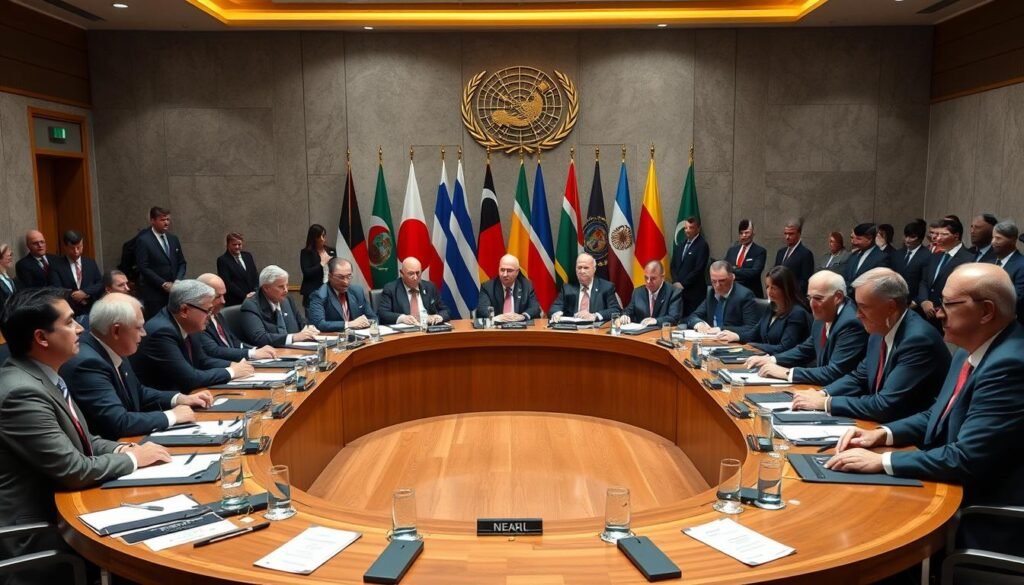
How world leaders respond to the bill will shape its global impact
Which scenario ultimately emerges will depend not only on the bill’s final provisions but also on how other global actors respond to America’s shifting approach. The international system remains dynamic, with multiple centers of power and influence shaping outcomes.
Conclusion: Navigating a Changing Global Landscape
The One Big Beautiful Bill represents more than just domestic policy—it embodies a vision for America’s role in the world that emphasizes strength, sovereignty, and national interest. Whether this approach leads to greater security and prosperity or increased isolation and conflict remains to be seen.
What is clear is that the legislation would mark a significant shift in how America engages with global challenges and opportunities. From military spending to border security, from energy policy to manufacturing incentives, the bill touches on fundamental aspects of America’s international posture.

The bill raises fundamental questions about America’s global role
As the legislative process continues, policymakers, analysts, and citizens alike must carefully consider the full range of foreign policy implications. The choices made today will shape America’s global relationships for years to come.
How would the One Big Beautiful Bill affect U.S. NATO commitments?
While the bill increases military spending, which could strengthen America’s NATO capabilities, it also reflects an “America First” approach that has previously questioned alliance burden-sharing. The impact would likely be mixed, with enhanced military capabilities alongside continued pressure on European allies to increase their own defense spending.
Would the bill affect America’s climate commitments?
Yes. By rolling back clean energy tax credits and adding incentives for coal production, the bill would significantly alter America’s approach to climate policy. This could affect participation in international climate agreements and cooperation with allies on environmental issues.
How might China respond to the bill’s economic provisions?
China would likely view provisions like the phased-in tax on Chinese-manufactured products as hostile economic measures. This could prompt retaliatory actions against American companies and exports, potentially escalating trade tensions.
Stay Informed on Foreign Policy Developments
Global affairs are constantly evolving. Subscribe to our Foreign Policy Briefing to receive expert analysis on how legislation like the One Big Beautiful Bill affects America’s international relationships.


